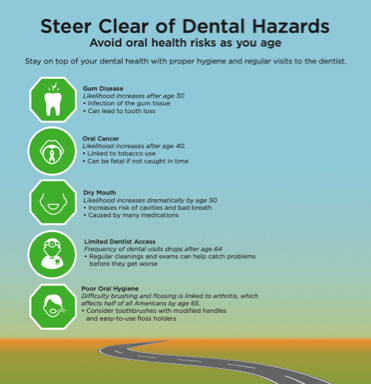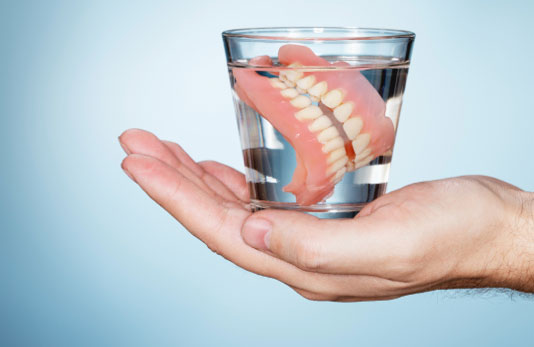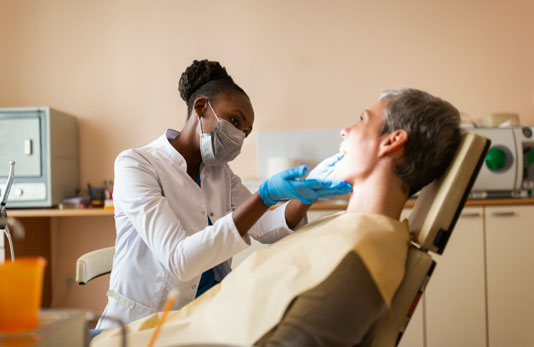Dental risks for seniors

With proper oral care, you can stay smiling well into retirement. Contrary to common belief, tooth loss isn't a result of the aging process. It's primarily the result of preventable oral disease. When you take care of your teeth throughout your life, you can help them last a lifetime.
As you age, your dental needs become increasingly specialized, making regular visits to the dentist even more essential. Look out for these common problems affecting older adults.
Gum (periodontal) disease
It's not just your teeth that matter — your gum health is just as essential to your oral health. Gum disease is an infection of the gum tissue that supports the teeth. The leading cause of tooth loss in adults, gum disease has two stages:
- Gingivitis. Caused by the bacteria found in plaque, gingivitis is an early stage of gum disease that is reversible with good oral hygiene and professional treatment. Symptoms include red, swollen gums and possible bleeding when you brush. If you have any of these symptoms, see a dentist as soon as possible. If left untreated, gingivitis can advance into periodontitis.
- Periodontitis. Periodontitis, a more severe form of gum disease, affects more than half of adults over 65. In this condition, bacterial infection causes your gums and the bone supporting the teeth to break down. Your gums may begin to recede, pulling back from the teeth. In the most severe cases, the bone supporting the teeth is destroyed and can result in tooth loss.
Cavities
As you age, your gums may pull back, or recede, due to gum disease or overbrushing. Receding gums exposes the root surfaces of your teeth, which makes your teeth more susceptible to decay. Tooth roots are more porous than the tooth crown.
Oral cancer
Oral cancer most often occurs in people over 40 years of age. See a dentist immediately if you notice any red or white patches on your gums, tongue or other oral tissues, and watch for sores that fail to heal within two weeks.
Oral cancer is often difficult to detect in its early stages, when it can be treated more easily. Your dentist should perform a head and neck exam to screen for signs of cancer at your regular checkups.
You may be at higher risk of oral cancer if you smoke or use tobacco, drink heavily or have prolonged exposure to the sun. Men and African Americans are also at higher risk.

Dry mouth
Taking prescription and over-the-counter medications can cause changes to your oral tissues. Always your give your dentist a complete list of any medication you're taking.
Many medications cause a decrease in saliva, leading to dry mouth. Saliva plays a major role in preventing tooth decay by rinsing away bacteria and food particles and by neutralizing harmful acids, so make sure to ask your dentist about ways to treat dry mouth.
Difficulty brushing and flossing
Limited dentist access
If you have difficulty accessing dental services because of transportation, medical conditions or limited mobility, ask a family member or friend to help schedule regular dental visits and provide transportation.
If you're considering moving to a senior community or assisted living facility, inquire about the facility's dental care services so you can plan accordingly for future care.
Video: What you should know about senior dental health
How you can maintain your overall health
Incorporate these practices into your dental health strategy:
- Brush and floss consistently. Follow a regular routine in which you brush your teeth twice a day and floss every day.
- Visit your dentist regularly. Regular dentist visits can do more than keep your teeth healthy. They can also give your dentist important information about your overall health.
- Choose healthy foods. What you eat affects your teeth and gums.
Keep dental health top of mind to maintain a healthy smile.

Poster: Steer clear of dental hazards
Understand which dental risks increase with age.
Last updated December 30, 2021
Related articles:
The oral health information on this website is intended for educational purposes only. Always consult a licensed dentist or other qualified health care professional for any questions concerning your oral health.


